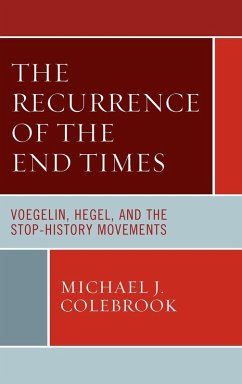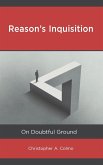- Gebundenes Buch
- Merkliste
- Auf die Merkliste
- Bewerten Bewerten
- Teilen
- Produkt teilen
- Produkterinnerung
- Produkterinnerung
The Recurrence of the End Times: Voegelin, Hegel, and the Stop-History Movements explores the deep connection between modern political ideologies and the secular eschatological hopes and dreams of a post-Christian society.
Andere Kunden interessierten sich auch für
![John Locke and the Uncivilized Society John Locke and the Uncivilized Society]() Scott RobinsonJohn Locke and the Uncivilized Society130,99 €
Scott RobinsonJohn Locke and the Uncivilized Society130,99 €![Eric Voegelin Today Eric Voegelin Today]() Eric Voegelin Today128,99 €
Eric Voegelin Today128,99 €![Alexandre Kojève Alexandre Kojève]() Alexandre Kojève50,99 €
Alexandre Kojève50,99 €![Reason's Inquisition Reason's Inquisition]() Christopher A. ColmoReason's Inquisition123,99 €
Christopher A. ColmoReason's Inquisition123,99 €![Alexandre Kojève Alexandre Kojève]() Alexandre Kojève134,99 €
Alexandre Kojève134,99 €![Putin's War and the Re-Opening of History Putin's War and the Re-Opening of History]() Jean-François CaronPutin's War and the Re-Opening of History33,99 €
Jean-François CaronPutin's War and the Re-Opening of History33,99 €![Merkmale politischer Religion in Hitlerjugend und Freier Deutscher Jugend Merkmale politischer Religion in Hitlerjugend und Freier Deutscher Jugend]() Stephanie WalterMerkmale politischer Religion in Hitlerjugend und Freier Deutscher Jugend47,95 €
Stephanie WalterMerkmale politischer Religion in Hitlerjugend und Freier Deutscher Jugend47,95 €-
-
-
The Recurrence of the End Times: Voegelin, Hegel, and the Stop-History Movements explores the deep connection between modern political ideologies and the secular eschatological hopes and dreams of a post-Christian society.
Hinweis: Dieser Artikel kann nur an eine deutsche Lieferadresse ausgeliefert werden.
Hinweis: Dieser Artikel kann nur an eine deutsche Lieferadresse ausgeliefert werden.
Produktdetails
- Produktdetails
- Verlag: Lexington Books
- Seitenzahl: 202
- Erscheinungstermin: 2. Juni 2022
- Englisch
- Abmessung: 235mm x 157mm x 17mm
- Gewicht: 486g
- ISBN-13: 9781793651341
- ISBN-10: 1793651345
- Artikelnr.: 62925442
- Herstellerkennzeichnung
- Libri GmbH
- Europaallee 1
- 36244 Bad Hersfeld
- gpsr@libri.de
- Verlag: Lexington Books
- Seitenzahl: 202
- Erscheinungstermin: 2. Juni 2022
- Englisch
- Abmessung: 235mm x 157mm x 17mm
- Gewicht: 486g
- ISBN-13: 9781793651341
- ISBN-10: 1793651345
- Artikelnr.: 62925442
- Herstellerkennzeichnung
- Libri GmbH
- Europaallee 1
- 36244 Bad Hersfeld
- gpsr@libri.de
By Michael J. Colebrook
Part I: General Introduction to the End of History Controversy
Chapter 1: The End of History, Identity Politics, and Transcendence
Chapter 2: The Origins of a Hegelian Misunderstanding
Part II: Hegel and the Crisis of Christian Salvation History
Chapter 3: Universal History Reimagined
Chapter 4: Elements of Historiogenesis
Chapter 5: Tradition-Bound Historiogenesis: Christian Historia Sacra
Chapter 6: Gnostic Historiogenesis: The Case of Hegel
Chapter 7: Historical Mankind and Historical Traditions
Part III: Intentionality and the Historical Process
Chapter 8: Voegelin on Human Consciousness
Chapter 9: Kojève's Hegel on Time and History
Chapter 10: Voegelin on the Problem of Time and the "Stop-History"
Movements
Part IV: Hegel's Eclipse of Reality
Chapter 11: Hegel as Psychiatric Case Study?
Chapter 12: Voegelin and R.D. Laing on the Divided Self
Chapter 13: Does Hegel Manifest Schizoid Symptoms?
Chapter 14: Shortcomings in Laing's Theory of the Two Selves
Chapter 15: Ontological Insecurity and Von Doderer's Analysis of Second
Realities
Chapter 16: Voegelin on Hegel's Second Reality
Chapter 17: Voegelin's Kojèvian "Code" as an Inadequate Interpretation of
Hegel's System
Part V: Kojève's Hegel: Deliberate Falsification or Valid Exegesis?
Chapter 18: Possible Interpretations of End of History Thesis
Chapter 19: Kojève on the Present and Future
Chapter 20: How Valid Are Kojève's Observations on the Modern World?
Chapter 21: Why Hegel's Rational State is neither Universal nor Homogeneous
Chapter 22: What is Hegel's Position on the End of History?
Chapter 23: Hegel on Transcendence and the "Beyond"
Conclusion: Transcendence, Death, and the Search for Order
Chapter 1: The End of History, Identity Politics, and Transcendence
Chapter 2: The Origins of a Hegelian Misunderstanding
Part II: Hegel and the Crisis of Christian Salvation History
Chapter 3: Universal History Reimagined
Chapter 4: Elements of Historiogenesis
Chapter 5: Tradition-Bound Historiogenesis: Christian Historia Sacra
Chapter 6: Gnostic Historiogenesis: The Case of Hegel
Chapter 7: Historical Mankind and Historical Traditions
Part III: Intentionality and the Historical Process
Chapter 8: Voegelin on Human Consciousness
Chapter 9: Kojève's Hegel on Time and History
Chapter 10: Voegelin on the Problem of Time and the "Stop-History"
Movements
Part IV: Hegel's Eclipse of Reality
Chapter 11: Hegel as Psychiatric Case Study?
Chapter 12: Voegelin and R.D. Laing on the Divided Self
Chapter 13: Does Hegel Manifest Schizoid Symptoms?
Chapter 14: Shortcomings in Laing's Theory of the Two Selves
Chapter 15: Ontological Insecurity and Von Doderer's Analysis of Second
Realities
Chapter 16: Voegelin on Hegel's Second Reality
Chapter 17: Voegelin's Kojèvian "Code" as an Inadequate Interpretation of
Hegel's System
Part V: Kojève's Hegel: Deliberate Falsification or Valid Exegesis?
Chapter 18: Possible Interpretations of End of History Thesis
Chapter 19: Kojève on the Present and Future
Chapter 20: How Valid Are Kojève's Observations on the Modern World?
Chapter 21: Why Hegel's Rational State is neither Universal nor Homogeneous
Chapter 22: What is Hegel's Position on the End of History?
Chapter 23: Hegel on Transcendence and the "Beyond"
Conclusion: Transcendence, Death, and the Search for Order
Part I: General Introduction to the End of History Controversy
Chapter 1: The End of History, Identity Politics, and Transcendence
Chapter 2: The Origins of a Hegelian Misunderstanding
Part II: Hegel and the Crisis of Christian Salvation History
Chapter 3: Universal History Reimagined
Chapter 4: Elements of Historiogenesis
Chapter 5: Tradition-Bound Historiogenesis: Christian Historia Sacra
Chapter 6: Gnostic Historiogenesis: The Case of Hegel
Chapter 7: Historical Mankind and Historical Traditions
Part III: Intentionality and the Historical Process
Chapter 8: Voegelin on Human Consciousness
Chapter 9: Kojève's Hegel on Time and History
Chapter 10: Voegelin on the Problem of Time and the "Stop-History"
Movements
Part IV: Hegel's Eclipse of Reality
Chapter 11: Hegel as Psychiatric Case Study?
Chapter 12: Voegelin and R.D. Laing on the Divided Self
Chapter 13: Does Hegel Manifest Schizoid Symptoms?
Chapter 14: Shortcomings in Laing's Theory of the Two Selves
Chapter 15: Ontological Insecurity and Von Doderer's Analysis of Second
Realities
Chapter 16: Voegelin on Hegel's Second Reality
Chapter 17: Voegelin's Kojèvian "Code" as an Inadequate Interpretation of
Hegel's System
Part V: Kojève's Hegel: Deliberate Falsification or Valid Exegesis?
Chapter 18: Possible Interpretations of End of History Thesis
Chapter 19: Kojève on the Present and Future
Chapter 20: How Valid Are Kojève's Observations on the Modern World?
Chapter 21: Why Hegel's Rational State is neither Universal nor Homogeneous
Chapter 22: What is Hegel's Position on the End of History?
Chapter 23: Hegel on Transcendence and the "Beyond"
Conclusion: Transcendence, Death, and the Search for Order
Chapter 1: The End of History, Identity Politics, and Transcendence
Chapter 2: The Origins of a Hegelian Misunderstanding
Part II: Hegel and the Crisis of Christian Salvation History
Chapter 3: Universal History Reimagined
Chapter 4: Elements of Historiogenesis
Chapter 5: Tradition-Bound Historiogenesis: Christian Historia Sacra
Chapter 6: Gnostic Historiogenesis: The Case of Hegel
Chapter 7: Historical Mankind and Historical Traditions
Part III: Intentionality and the Historical Process
Chapter 8: Voegelin on Human Consciousness
Chapter 9: Kojève's Hegel on Time and History
Chapter 10: Voegelin on the Problem of Time and the "Stop-History"
Movements
Part IV: Hegel's Eclipse of Reality
Chapter 11: Hegel as Psychiatric Case Study?
Chapter 12: Voegelin and R.D. Laing on the Divided Self
Chapter 13: Does Hegel Manifest Schizoid Symptoms?
Chapter 14: Shortcomings in Laing's Theory of the Two Selves
Chapter 15: Ontological Insecurity and Von Doderer's Analysis of Second
Realities
Chapter 16: Voegelin on Hegel's Second Reality
Chapter 17: Voegelin's Kojèvian "Code" as an Inadequate Interpretation of
Hegel's System
Part V: Kojève's Hegel: Deliberate Falsification or Valid Exegesis?
Chapter 18: Possible Interpretations of End of History Thesis
Chapter 19: Kojève on the Present and Future
Chapter 20: How Valid Are Kojève's Observations on the Modern World?
Chapter 21: Why Hegel's Rational State is neither Universal nor Homogeneous
Chapter 22: What is Hegel's Position on the End of History?
Chapter 23: Hegel on Transcendence and the "Beyond"
Conclusion: Transcendence, Death, and the Search for Order








